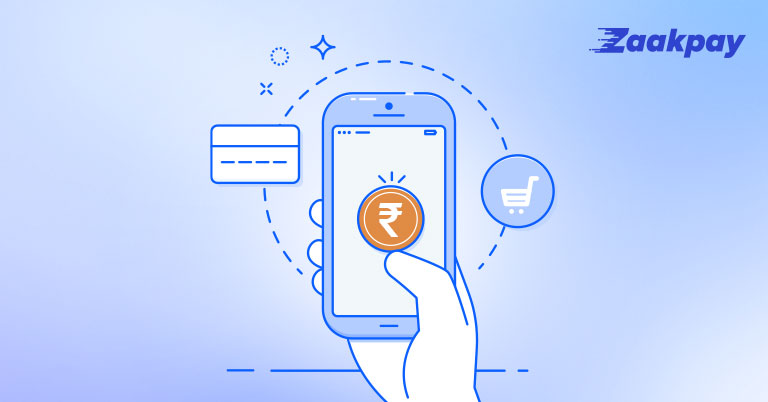Consumer preference for card payments continues unabated for purchases, whether in the brick-and-mortar or digital marketplaces, despite the foray made by mobile payments and payment gateway systems. The digital payments space management comes under the merchant services domain covering various financial services for businesses. The term is broadly described to cover behind-the-scenes processes to accept online payment.
Emerging technologies have transformed merchant accounts from traditional credit card payment acceptance to encompass various tools. As a business owner, you must build your understanding of the multiple payment processing methods and choose the right online merchant account. Zaakpay is a one-stop destination for your software integration to establish a seamless merchant payment processing ecosystem. Power your payments with Zaakpay all-in-one payments solution.
Understanding What Merchant Solutions Are
In layman’s terms, merchant solutions or services are designed to accept payment from the customer. For example, the customer payment through credit card processing endures ten well-defined approval steps before the payment is accepted.
- The customer’s credit card information is captured and transmitted to the merchant’s acquiring bank.
- The transaction then flows to the processor.
- The card company or the association (Visa, Mastercard, Amex, etc.) routes data to the card-issuing bank.
- Here, the transaction is either approved or declined.
- The issuing bank transmits a code to the card association.
- This code then travels to the merchant’s acquiring bank.
- The code’s final destination is the merchant’s terminal.
- The transaction gets completed.
- The terminal delivers a print to the merchants.
- The customer clears the credit card bill as per the billing cycle.
Now it is time to learn where the money heads as the payment travels the distance. That leads us to the following query.
What is a merchant account?
A merchant account is the transit point where the money rests before ending in the business bank account. Thus, the “middleman” coordinates all the payment elements starting from the customer’s payment card finally ending up securely into the bank account. Unlike a typical bank account, the intermediary online merchant account is essential for your business to accept credit or debit card payments.
Merchant Account Features:
- Unlike a characteristic bank account, the online merchant account temporarily holds transaction money while processing the payment.
- The merchant account works in tandem with the card networks, processors, and issuers to finally direct the transaction to your bank account.
- The merchant account is identified with a unique merchant ID specific to the business and leveraged by the acquiring bank.
- An extra security layer protects card payments.
Setting Up a Merchant Account
After learning about the merchant account fundamentals, now we arrive at the cardinal query, how to set up? First, let us look closely at the five steps needed.
- Accepting credit card payments: Business needs for accepting payments is unique without a one-size-fits-all solution. The usual methods for accepting credit card payments are online, by phone, mail, or person.
- Choosing the proper account: You have three options to choose from – your bank, independent sales organization (ISO), and member service provider (MSP).
- Research pays: Choosing the service provider is a tricky job. First, evaluate the prospective for understanding their fee structure, customer support solution, security features, and finally, the overall account offering. Zaakpay is one of the best payment gateway with robust security, customer support at a low cost.
- Select the account matching your needs: The provider will hold hands while opening the merchant account, similar to a business bank account. Thus, the application fetches your personal and business details, similar to most financial products.
- Contract signing: You must review and scan the contract. The provider must satisfy all your preferences and specific business needs before signing the dotted line to endorse the contract.
Merchant Account Fee Structure
Evaluate the service provider’s fee structure while looking for merchant account options as a business owner. Depending on your business operations, size, risk factors, and merchant services history, several factors determine the fee structure. The indicative list below covers the potential fees:
- Setup Application Fee
- Transaction Fee (Flat or Actual)
- Address Verification Service Fee
- Batch Fee (Daily)
- Service Fee (Monthly)
- Internet Gateway Fee (When using a third-party payment processor)
- Minimum Fee (Monthly)
- Reprogramming Fee
- Chargeback Fee
- Annual Fee
- Cross Border Fee
- Termination Fee (Fixed)
Ensuring Card Payment Security
Card payment security is critical to any online payment system. PCI (Payment Card Industry) Data Security Standards Council enforces strict protocols aligned with the digital payment scenario to prevent cybercrime. Service providers are expected to rigorously implement the standards to ensure credit card data integrity and earn customer loyalty. Zaakpay payment gateway provides comprehensive merchant account solutions comparable to the benchmark industry standards.
Choosing the Best Merchant Account Service Provider
As we have already discussed, every business need is unique. Therefore, choosing the right service provider best suited for conducting merchant transactions is crucial for growth and success in creating a brand identity. So, let us explore the factors you must consider to make an informed choice and select a service provider that will deliver a preference-matching solution.
- Customer Service: Payments and uninterrupted cash flow are vital elements in the customer service journey of a business. The service provider must be up to it.
- Review Evaluation: Customer reviews are a good source for any product evaluation, and the service provider is no exception. The internet offers an ideal resource to evaluate client reviews about the short-listed service provider before you zero in.
- In-house Integration: The merchant payment acceptance regime in your business decides the suitable integration parameters. Today’s technology advances allow tailored integration solutions the service provider evaluates based on your specifics. For example, a POS terminal-based checkout and online phone transactions are factored in independently for a tailored solution. Seamless software integration helps your business be up and running in no time.
- Payout Frequency: Credit card payment processing carries inherent risks, and closing a merchant transaction as per schedule is crucial to the business’s health. Whatever the frequency – daily or weekly depending on the credit card issuer cycle, you must feel confident of the prospective merchant account service provider.
- Rates and Fees: Your business to eliminate any ambiguity in the fee structure proposed by the service provider. Before committing, you must discuss the proposed rates and fees with your service provider. It makes sense to remember that quality service comes with high fees and vice versa.
- Terms and Conditions: Signing the contract seals your deal with the chosen merchant account service provider. However, you must understand all the contract clauses before signing. Read the fine print and scan every section before finally affixing your signature.
Bottom Line
Setting up a merchant services account is crucial in accepting credit card payment’s journey. Consumers are selective about the checkout experience involving card payments, expecting a secure and fast conclusion. As a business owner, you must evaluate your goals and choose a service provider from a wide-ranging choice. It helps to ask questions of the providers and select that addresses all concerns transparently.
Follow Us on:

